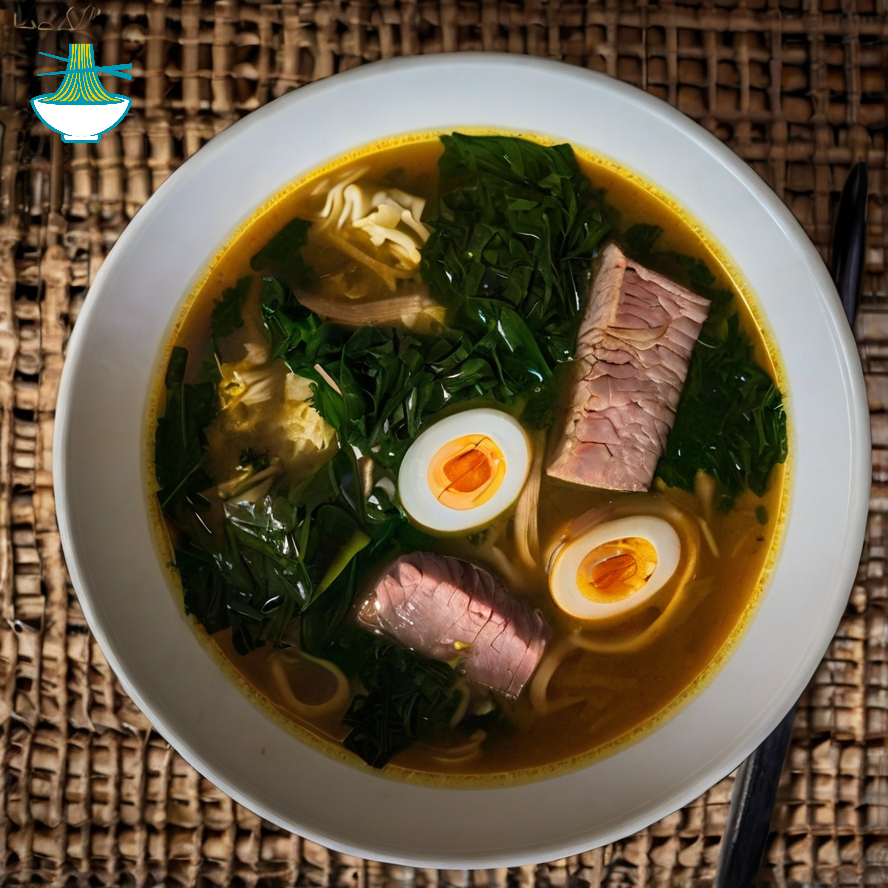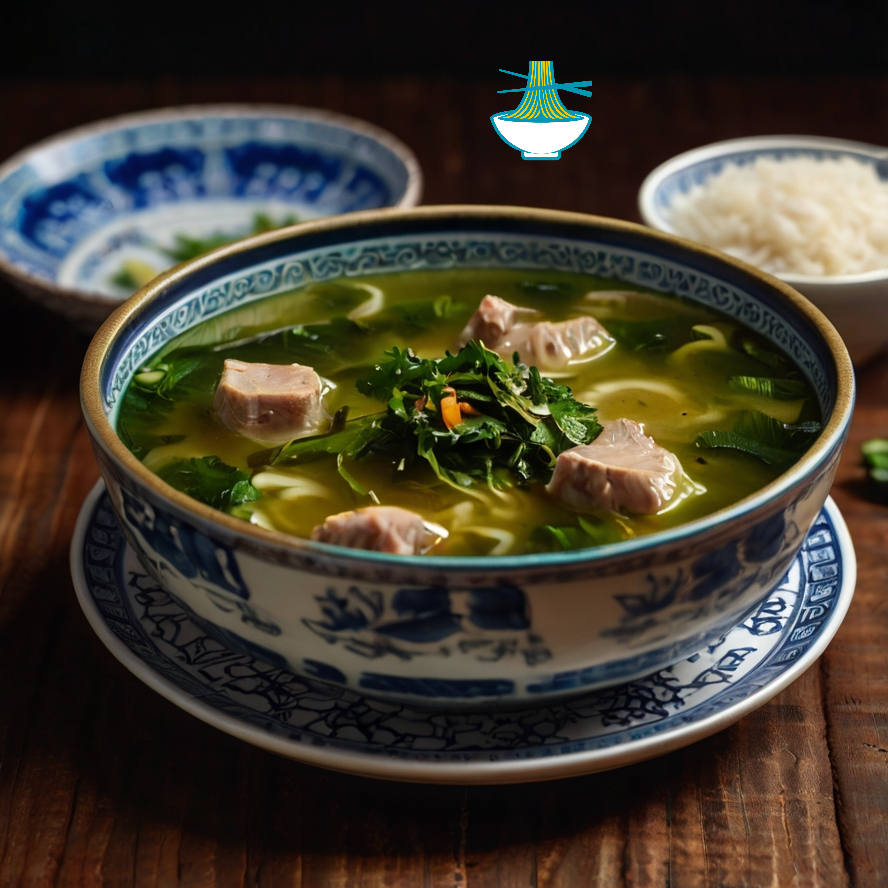Bitterleaf Soup is a flavorful and nutritious dish from Liberia, featuring the distinct taste of bitter leaves complemented by meat or fish. The bitter leaves, rich in vitamins A and C, iron, and calcium, provide numerous health benefits, including boosting immunity, supporting digestion, and improving skin health. When combined with protein-rich meat or fish, this soup becomes a wholesome meal. While the soup’s unique bitterness might be an acquired taste, it is cherished for its complex flavor and nutritional value. Paired with fufu or rice, it’s a comforting and hearty meal that embodies the essence of Liberian cuisine.
Ingredients:
- 2 cups bitter leaves (fresh or dried, washed thoroughly)
- 1 pound meat (beef, goat, or chicken)
- 1 cup smoked fish (optional)
- 1/4 cup vegetable oil
alternative: 1/4 cup clarified butter (desi ghee)
- 1 medium onion, chopped
- 2 tablespoons ground crayfish
- 2 tablespoons tomato paste
- 1 teaspoon ground pepper (or to taste)
- 1 teaspoon salt
- 4 cups water
Ingredient Substitutes:
- For those looking to modify the recipe for health reasons, you can replace vegetable oilwith olive oil for a healthier fat profile. Olive oil provides monounsaturated fats, which are known to promote heart health by reducing bad cholesterol levels. Additionally, if you're looking for a lighter soup, you can reduce the amount of meat used and add legumes such as lentils or chickpeas for a plant-based protein source.
Instructions:
1. Thoroughly Wash Your Bitter Leaves
The bitterness of the leaves can be intense, so it’s essential to wash them properly. Rinse them multiple times in cold water, then boil for 10 minutes to further reduce the bitterness. This step ensures a balanced flavor profile, where the bitterness of the leaves enhances the soup without overpowering the dish.
2. Simmer Meat to Perfection
For a tender and flavorful base, it’s crucial to simmer the meat properly. After adding the meat, onion, and 2 cups of water to the pot, allow it to simmer for 20-30 minutes until the meat is tender. This slow cooking method will bring out the natural flavors of the meat and create a rich broth.
3.Add Seasonings in Layers
To build depth of flavor, add the vegetable oil, tomato paste, ground crayfish, and ground pepper after the meat has simmered. Stir these ingredients well, allowing them to infuse into the broth, creating a flavorful foundation for the soup. If you’re using ghee (clarified butter), it can bring a richer, more aromatic finish to the dish.
4. Incorporate Bitter Leaves and Smoked Fish
Once your seasoning base is set, add the washed bitter leaves and smoked fish (if using). Smoked fish introduces a unique depth, complementing the bitterness of the leaves. Stir everything thoroughly to distribute the flavors evenly, then simmer for another 15-20 minutes, allowing the ingredients to meld together.
5. Taste and Adjust Seasoning
As the soup simmers, taste frequently to ensure the seasoning is balanced. The bitterness from the leaves can change depending on their preparation, so feel free to add extra salt or ground pepper to achieve the desired taste. Taste-testing at this stage will help you fine-tune the flavors for a well-seasoned dish.
6. Serve with the Perfect Side
Bitterleaf Soup is traditionally served with fufu or rice. Fufu’s texture complements the richness of the soup, while rice provides a lighter alternative. Ensure the soup is served hot, as the warmth enhances the flavors, creating a comforting, satisfying meal.
Serving Suggestions:
- While Bitterleaf Soup is delicious on its own, pairing it with fufu or rice makes for a more filling and satisfying meal. You can also serve the soup with a side of plantains or cassava for a more traditional experience. For an extra layer of flavor, try adding a small amount of tomato sauce or fresh chili peppers to give the soup a little more kick and complexity.
Storage Tips:
- If you're looking to store your Bitterleaf Soup, it's best to keep it in an airtight container and refrigerate it for up to 2-3 days. For longer storage, you can freeze the soup in individual portions, which will last for up to 3 months. To reheat, simply thaw and warm it over low heat. This helps preserve the nutrients and ensures that the soup maintains its flavor and texture.
Healthy Additions:
- To further boost the nutritional value of Bitterleaf Soup, you can add herbs like parsley or cilantro. These herbs are rich in vitamins and minerals such as Vitamin C, Vitamin K, and folate. Parsley is also known for its antioxidant properties, which can help reduce inflammation and support overall immune function. Cilantro, on the other hand, contains Vitamin A and fiber, promoting digestive health and offering additional detoxifying benefits.
Improving Nutritional Benefits:
- The soup is rich in Vitamin C and iron, which play crucial roles in boosting the immune system and improving skin health. The high fiber content from bitter leaves supports digestive health by promoting healthy gut bacteria and regular bowel movements. The soup’s anti-inflammatory properties can also help reduce the risk of chronic diseases such as arthritis, thanks to the antioxidants found in bitter leaves, tomatoes, and other ingredients.
Frequently Asked Questions:
1. Can Bitterleaf Soup be included in a vegetarian diet?
- Yes, Bitterleaf Soup can be adapted for vegetarian diets by substituting the meat with fish, tofu, or legumes like beans or lentils. These alternatives provide plant-based proteins, ensuring the soup remains a wholesome and balanced meal.
2. Does the soup contain gluten?
- No, Bitterleaf Soup is naturally gluten-free, making it an excellent choice for those following a gluten-free diet. As long as no gluten-containing ingredients like wheat-based noodles are added, the soup is safe for individuals with gluten sensitivities or celiac disease.

Nutritional values and benefits:
1. 1 Cup Bitter Leaves (100g)
- Calories: 50
- Carbohydrates: 8g
- Protein: 3g
- Fat: 1g
- Fiber: 4g (16% DV)
Vitamins:
- Vitamin A: 3,500 IU (70% DV)
- Vitamin C: 45mg (75% DV)
- Vitamin E: 2mg (10% DV)
Minerals:
- Iron: 3mg (17% DV)
- Calcium: 150mg (15% DV)
- Potassium: 300mg (8% DV)
- Nutritional Benefit: Bitter leaves are rich in antioxidants, aiding digestion, improving liver function, and supporting healthy skin and vision. Their high fiber content promotes gut health and helps regulate blood sugar levels.
2. 1 Pound Meat (Beef, Goat, or Chicken, 450g)
- Calories: 700
- Protein: 62g
- Fat: 50g
- Saturated Fat: 20g
Minerals:
- Iron: 5mg (28% DV)
- Zinc: 7mg (47% DV)
- Nutritional Benefit: Meat provides high-quality protein essential for muscle repair and growth. It also offers iron for healthy red blood cells and zinc for immune function and wound healing.
3. 1 Cup Smoked Fish (Optional, 85g)
- Calories: 150
- Protein: 22g
- Fat: 5g
- Omega-3 Fatty Acids: 0.5g
Minerals:
- Calcium: 120mg (12% DV)
- Iron: 2mg (11% DV)
- Magnesium: 30mg (8% DV)
- Nutritional Benefit: Smoked fish enhances the flavor of the soup and provides omega-3 fatty acids, which promote heart and brain health. It also offers calcium and magnesium for strong bones and muscle function.
4. 1/4 Cup vegetable oil (60g)
- Calories: 480
- Fat: 54g
- Saturated Fat: 13g
Vitamins:
- Vitamin E: 6mg (40% DV)
- Vitamin A: 1,200 IU (24% DV)
- Nutritional Benefit: vegetable oil is a source of healthy fats and antioxidants, supporting energy levels, skin health, and cell protection.
5. 1 Medium Onion (70g)
- Calories: 28
- Carbohydrates: 6.5g
- Protein: 0.8g
- Fat: 0.1g
- Fiber: 1.2g (5% DV)
Vitamins:
- Vitamin C: 5mg (9% DV)
Minerals:
- Potassium: 102mg (3% DV)
- Nutritional Benefit: Onions are low in calories and provide antioxidants such as quercetin, which support heart health and immunity. They also have anti-inflammatory properties.
6. 2 Tablespoons Ground Crayfish (20g)
- Calories: 60
- Protein: 8g
- Fat: 2g
Minerals:
- Calcium: 50mg (5% DV)
- Magnesium: 20mg (5% DV)
- Nutritional Benefit: Ground crayfish adds umami flavor and provides essential nutrients such as calcium for bone health and protein for muscle repair.
7. 2 Tablespoons Tomato Paste (30g)
- Calories: 30
- Carbohydrates: 7g
- Protein: 1g
- Fiber: 2g (8% DV)
Vitamins:
- Vitamin A: 1,000 IU (20% DV)
- Vitamin C: 6mg (10% DV)
- Nutritional Benefit: Tomato paste is rich in lycopene, an antioxidant that supports heart health and reduces inflammation. Its vitamin A content helps maintain vision and skin health.
8. 1 Teaspoon Ground Pepper (2g)
- Calories: 6
- Carbohydrates: 1.4g
- Protein: 0.2g
- Fiber: 0.7g (3% DV)
Minerals:
- Iron: 0.2mg (1% DV)
- Nutritional Benefit: Ground pepper adds spice to the dish and contains capsaicin, which may improve metabolism and circulation.
9. 1 Teaspoon Salt (5g)
- Sodium: 2,300mg (96% DV)
- Nutritional Benefit: While salt enhances flavor, it should be used in moderation to maintain healthy blood pressure.
Summary of Nutritional Benefits:
- Bitterleaf Soup combines nutrient-dense ingredients to create a hearty and balanced meal. Bitter leaves are packed with antioxidants and vitamins that support immunity, digestion, and skin health. The addition of protein-rich meat or fish enhances muscle repair and provides essential minerals like iron and zinc. vegetable oil, tomato paste, and ground crayfish contribute healthy fats, antioxidants, and umami flavor. This dish is not only a flavorful Liberian staple but also a powerhouse of nutrients for overall well-being.


Comments